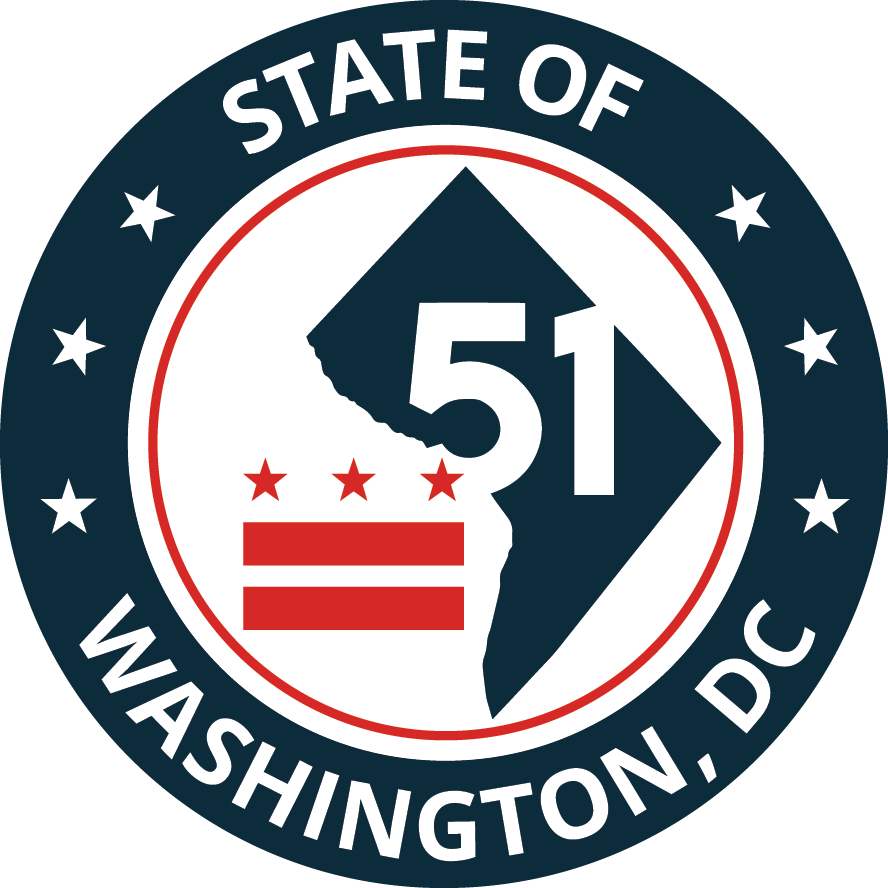District of Columbia Governance
Since the passage of the DC Home Rule Act on December 24, 1973, the District has been governed much like any state in the US. There are three separate, co-equal branches of government: legislative, executive, and judiciary, each providing checks and balances.
There are, however, a few important areas in which the District government cannot operate with the same autonomy that governments in the 50 states do. States generally have the power to make and enforce laws, to create their own agencies, and to manage their affairs free from interference from the federal government. They also have voting representation in both Houses of Congress. This is not the case for DC.
National Level Representation
DC residents elect a non-voting delegate to the US House of Representatives, two shadow Senators, and one shadow Representative whose task is to petition Congress for statehood.
LACK OF AUTONOMY
- District residents have no voting representation in the House of Representatives. And, whereas residents in all 50 states have two Senators, DC residents have no representation at all in the Senate.
Legislative
The District Council is the legislature for the District of Columbia. All races for Council are partisan, with two seats reserved for members who are not from the majority party. Of the 13 Council members, four are elected at-large, as is the Chair, and eight are elected from one of the District’s eight wards. Members serve for 4-year terms. The Council enacts legislation and has the power to create, abolish or organize any District agency. The Council essentially serves year-round, breaking for a summer recess from mid-July to mid-September when Council members concentrate on constituent services. The body is unicameral, just as is the Nebraska Legislature. Incidentally, the Nebraska state legislature with 49 members is the smallest in the US; New Hampshire with 425 members is the largest.
The District also elects Advisory Neighborhood Commissions (ANCs). The system was designed to bring the government closer to the people and allow the people to get closer to the government. Today, there are 40 ANCs. Commissioners are elected to 2-year terms in a nonpartisan election and serve without pay. Each represents approximately 2,000 people in a Single Member District.
LACK OF AUTONOMY
- The Home Rule Charter mandates the composition of the Council in two ways.
- First, the number of legislators is restricted to 13 with no provision for growth in population or complexity of governing.
- Second, no more than two of the four at-large positions can be nominated by the same party.
- Most importantly, all legislation enacted, including the annual budget, must be submitted to Congress. Congress has 30 legislative days (days Congress is in session) to review the legislation, 60 days in the case of certain laws related to criminal proceedings.
- There are no exceptions, and any piece of legislation may be amended or overturned.
Executive
- The Chief Executive of the District is the Mayor. The mayor has the responsibility to enforce all city law; administer and coordinate city departments, including the appointment of a City Administrator and heads of the departments (subject to confirmation by the Council); to set forth policies and agendas, and to prepare and submit the DC budget to the Council at the end of each fiscal year.
- The mayor either approves or vetoes bills passed by the DC Council; submits drafts of legislation to the Council; and can propose federal legislation or action directly to the president and/or Congress. Mayors can draft and enact executive orders relative to the departments and officials under their jurisdiction and reorganize any entities within the executive branch (except in the case of formal disapproval by the Council). The mayor is elected to a 4-year term in the same year as mid-term elections take place. There are no term limits in the District. If the mayor is unable to serve, the Chair of the District Council acts until a new mayor is elected.
- The District’s agencies mirror those in most of the 50 states. Agencies include Planning and Economic Development; Public Schools; Health; Public Safety and Justice, which includes the Metropolitan Police Department and the Department of Human Resources; Policy and Legislative Affairs; and General Counsel. The District now elects its Attorney General. There are also a number of independent agencies, which include the DC Public Library, the University of DC, and the Criminal Justice Coordinating Council.
LACK OF AUTONOMY
- Like a governor, the Mayor signs bills before they become law. Unlike a governor, she must await Congressional approval before a law takes effect.
Judiciary
The District has two courts: the DC Court of Appeals, which is the equivalent of state Supreme Courts and Superior Court, which is the trial court for DC. In addition, four other bodies form the Judiciary branch. The Joint Committee on Judicial Administration handles various administration and personnel issues, including audits, annual budget requests, and liaison with other court systems.
The Commission on Judicial Disabilities and Tenure is the judicial disciplinary agency that has the power to censure, reprimand or remove judges from either the DC Court of Appeals or the Superior Court. The 7-member Judicial Nomination Commission selects and recommends candidates for judgeships. Members are appointed by the US President, DC Mayor, DC Council, Chief Judge of the US District Court, and the DC Bar. The Sentencing and Criminal Code Revision Commission develops recommendations for sentencing standards and code revisions; they also maintain statistics, do training, and create guidelines.
LACK OF AUTONOMY
- The 50 states generally use one of five different methods for selecting their judges:
- 1) appointment by the governor;
- 2) appointment by the state legislature;
- 3) merit selection by a legislative committee based on past performance (some states also employ “retention elections” after judges have been in place);
- 4) partisan elections;
- 5) non-partisan elections.
The common thread is that judges for any state are selected by some state action. Judges in the DC Court of Appeals and DC Superior Court are appointed by the President of the United States. DC is the only jurisdiction without the power to appoint its own judges.
More information can be found at the League of Women Voters of the District of Columbia website.



 MENU
MENU